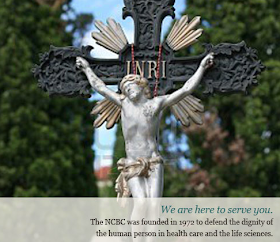A few days ago, Pope Francis and his spokesman Federico Lombardi directly contradicted the traditional teaching of the Catholic Church on contraception, including directly contradicting the clear words of Pope Paul's 1968 encyclical Humanae vitae. Various "Catholic" individuals and groups quickly lined up to support Francis, including the often heterodox Filipino Catholic Bishops Conference. But a surprisingly large and strong set of Catholics--beyond the expected set of minority traditionalists--has now risen up to resist, as if Francis, after years of this this sort of thing, has now crossed an obvious line.
Who knew that line would be you know where.
Thus, we now have a statement from the National Catholic Bioethics Center (NCBC) firmly rejecting the Pope's recent claims. The NCBC is a Catholic "establishment" or "mainstream" group if any group is, featuring on its Board of Directors the archbishops of a number of American cities, including Sean Cardinal O'Malley of Boston and Donald Cardinal Wuerl of Washington. Here is an excerpt:
Zika Does Not Justify Abortion or Contraception
February 22, 2016
Given the spread of the Zika virus and microcephaly within the Western Hemisphere, some have recommended the use of abortion and contraception as appropriate tools in the fight against this disease. In the following statement, the Ethicists of the NCBC reply to numerous media inquiries and give guidance to faithful Catholics on this topic.Full stop: "Some have recommended"? Who would that be, precisely?
. . . Zika is the most recent and high-profile instance of any number of diseases that might have deleterious effects on the unborn children whose mothers contract it while pregnant. In no way, however, would it justify a change in the Catholic Church’s consistent teachings on the sacredness and inviolability of human life and the dignity and beauty of the means of transmitting life through marital relations. Direct abortion and contraceptive acts are intrinsically immoral and contrary to these great goods, and no circumstances can justify either.
. . . Humanae vitae also goes on to explain what “due respect to moral precepts” includes. Paul VI teaches that such respect excludes “any action which either before, at the moment of, or after sexual intercourse, is specifically intended to prevent procreation—whether as an end or as a means” (HV, n. 14). In response to the notion that contraception might be an acceptable lesser evil when compared to direct abortion, he further clarifies:
. . . Neither is it valid to argue, as a justification for sexual intercourse which is deliberately contraceptive, that a lesser evil is to be preferred to a greater one. . . Though it is true that sometimes it is lawful to tolerate a lesser moral evil in order to avoid a greater evil or in order to promote a greater good, it is never lawful, even for the gravest reasons, to do evil that good may come of it—in other words, to intend directly something which of its very nature contradicts the moral order, and which must therefore be judged unworthy of man, even though the intention is to protect or promote the welfare of an individual, of a family or of society in general. (HV, n. 14)
This provides the foundation to answer a question increasingly being asked—whether it is ethical to use contraceptive methods, such as condoms, to reduce the likelihood of transmission of the Zika virus. Apart from the scientific questions about the actual effectiveness of condoms in disease prevention, using condoms to reduce the likelihood of Zika transmission amounts to directly intending contraceptive acts of intercourse as a means to a good end. It “deliberately frustrate[s] . . . the natural power and purpose” of marital intercourse (see CC, n. 54). In the case of a woman who is already pregnant, condom use could not have the effect of preventing pregnancy, but it would prevent a true marital act from taking place, which always involves a complete giving and receiving on the part of the husband and wife.
Some might also wonder about the use of contraceptive pills or intrauterine devices as a form of self-defense against the disease. This line of reasoning is invalid: hormonal contraceptives, IUDs, and morning-after pills do nothing to prevent sexual transmission of disease, but rather prevent the conception of a new human life or the implantation of an existing embryonic human being. Their use would amount to directly intending contraception or early abortion as a means of preventing potential birth defects. In other words, it would deliberately violate the unitive and procreative meanings of human self-giving in marital intimacy or purposefully destroy innocent human life, which are means that no good end can justify.I'm not predicting that all the players will necessarily stand by this. Thus, O'Malley and Wuerl didn't write this letter and it wouldn't surprise me if they in effect disavowed it. But it also wouldn't surprise me if they didn't. The tide is possibly turning and you never know how people interested in holding onto power or merely just landing on their feet will react.
Fasten your seat belts. It's going to be a bumpy night.

Sad to have to remember that Catholic prelates are often worldly men, “rich” in terms of prestige, and fearful of losing the respect of their worldly peers.But it is so. Phillip Neri probably shook his head at the naivety of heretics like Luther and Calvin, neither of whom knew the real depths of corruption in the Roman Church of his time.
ReplyDeleteI know that this post is a month old, however, I just had an interesting conversation with one of my MD mentors. She is Protestant. I was explaining to her why I couldn't apply for a primary care position at the facility where she practices medicine.
ReplyDeleteMD: "But why? Why can't you prescribe birth control? Even the Pope says that it's OK now!"
Indeed.